Most universities do not really care about research misconduct. But the University of Münster in Germany now acted exemplary and found a professor guilty of research misconduct for what superficially appears like a minor mistake in figure assembly. Because of a past research misconduct finding, due diligence was applied, and now the university decided to screen all papers of the same professor.
The professor in question is the neuroscientist and molecular cell biologist Andreas Püschel. Important is: Püschel’s significant co-author on all 3 papers with past and current research misconduct findings is his then-PhD student and stem cell researcher Jens Schwamborn, now professor at the University of Luxembourg. Is it maybe time to investigate Schwamborn’s PhD thesis also?
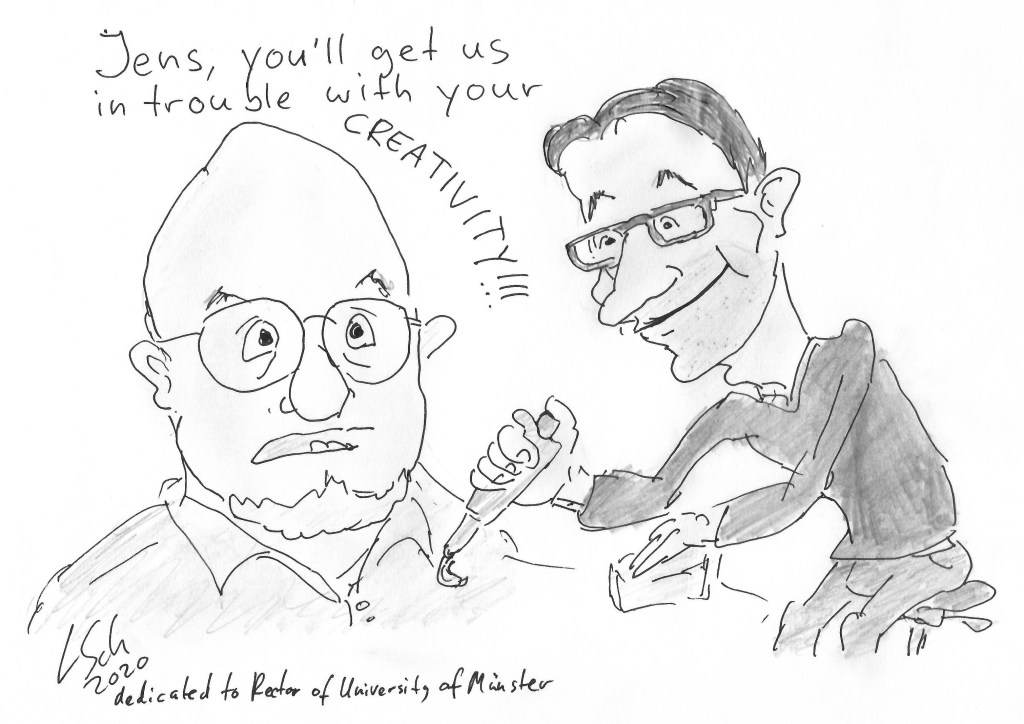
Before that tenure move to Luxembourg, Schwamborn did a postdoctoral stint in the lab of the well-known stem cell and neuroscience researcher Jürgen Knoblich in Vienna, and then returned to Münster to become group leader at the Max Planck Institute under the patronage of Hans Schöler, University of Münster professor and one Germany’s most influential stem cell scientists.
I covered the affair over 5 years ago, for a German magazine (read here and here). The articles contain also an official statement from the University of Luxembourg that Schwamborn was sufficiently punished by the University of Münster and the DFG and no additional measures were needed.
It started in 2013, when Schwamborn moved to take his professorship chair in Luxembourg. An anonymous whistleblower gathered evidence of data manipulation in two Schwamborn and Püschel papers and then contacted the University of Münster and the German Research Council (DFG), as well as Paul Brookes, the US-based biomedical scientist who used to operate a website dedicated to research misconduct. Brookes in turn posted the evidence on the now-defunct PubMed Commons website, and the papers Schwamborn et al EMBO J 2007 and Schwamborn et al JBC 2007 were soon retracted, after both Schwamborn and Püschel were found guilty of research misconduct, first by their University of Münster, then by the DFG.
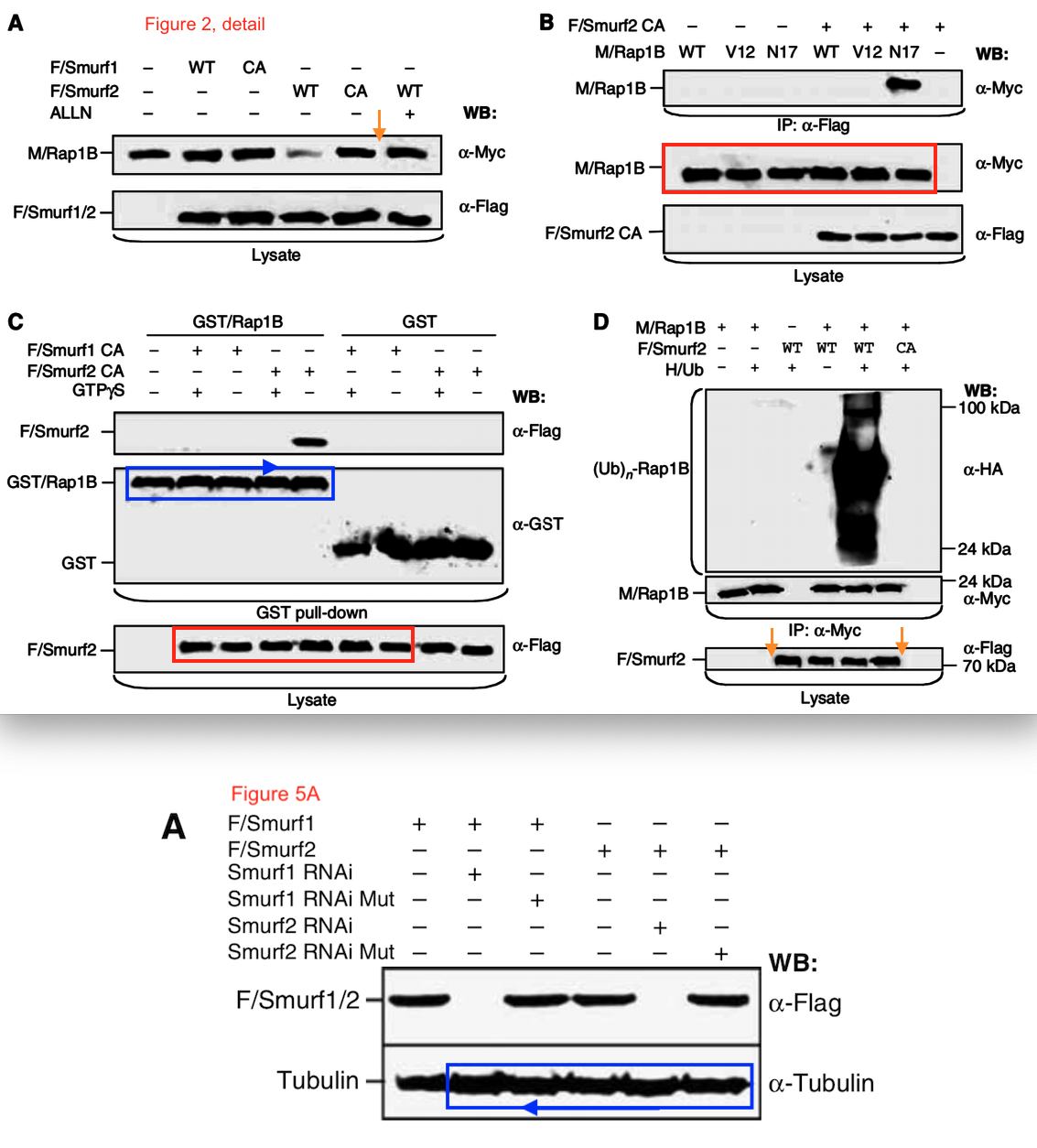
Back then, I was in contact with the original source, who mentioned to me another Schwamborn’s paper, in Cell and from Knoblich lab (Schwamborn et al Cell 2009), referring to evidence in the original lab books. However, the source never got in touch again since. Maybe Knoblich wants to have a look anyway?
In Luxembourg, the affair was buried. Maybe the small newly-established university of a tiny country was afraid to anger someone very important in Germany. Incidentally, in 2016, two years after the misconduct findings in Münster, Schwamborn was awarded €1.5 million from the EU to cure Parkinson’s, of which University of Luxembourg was immensely proud. The significant consortium partner happened to be Hans Schöler. In any case, Schwamborn remained a respectable scientist, with a big lab brimming with young trainees eager to learn the high art of sciences from their master. Does any one of these young scientists know of the misconduct findings in Germany against their PI? Do the students whose PhD defences Schwamborn supervises know he retracted two of his own PhD papers for data manipulation, and just corrected a third, also for data manipulation?
The Luxembourg lab research appears not just in Frontiers and Scientific Reports, also the official journal of the International Society for Stem Cell Research (ISSCR), Stem Cell Reports, regularly publishes Schwamborn’s papers. This may or may not be connected to the fact that the ISSCR board of directors member and Schwamborn’s former host at Münster, Schöler, is coauthor on these same papers (as opposed to that, Knoblich has not authored any papers with Schwamborn since 2011). In 2018, the European Union, always keen to invest in misconduct-tainted start-ups, stuffed some cash into Schwamborn’s cleavage:
“Braingineering Technologies (BTech), the “brainchild” of Professor Jens Schwamborn, is a young and innovative spin-off company from the Luxembourg Centre of Systems Biomedicine (LCSB), an interdisciplinary centre of the University of Luxembourg. BTech cultures human induced pluripotent stem cells (iPSCs) in a specific environment, thereby stimulating the development of so-called mini-brain organoids.“
Schwamborn’s private company is namely curing Parkinson’s disease while his detractors at the University of Münster waste time and resources finding more misconduct in his old research papers with Püschel.
Some time ago, Elisabeth Bik kindly agreed to look at Schwamborn’s publications, and found this:

Uwe Schlomann , Jens C Schwamborn , Myriam Muller , Reinhard Fassler , Andreas W Puschel The stimulation of dendrite growth by Sema3A requires integrin engagement and focal adhesion kinase Journal of Cell Science (2009)
doi: 10.1242/jcs.038232
It may look like a minor oversight of unintentional duplication, which every single university I am aware of would not even investigate. I informed the university nevertheless. The paper was swiftly corrected in January 2020, but now follows what the University of Münster decided in this regard, in a letter from 17 July 2020 they sent me per mail. It has been translated by me using Google Translate as lazy template.
Allegation of scientific misconduct
Appointment of an external expert commission
Dear Mr. Schneider,
As rector of the Westphalian Wilhelms University (WWU) Münster, I inform you that your complaint dated December 1st, 2019 “because of further data manipulation” against Prof. Dr. Püschel, Department of Biology at WWU, and Prof. Dr. Schwamborn, who is no longer active at the WWU, the investigation commission in accordance with the principles for the procedure in the event of suspected scientific misconduct has been received by the University of Münster via the ombudsman of the university, Prof. Dr. Ehlers.
In connection with the complaint, the investigative commission gave in December 2019 all authors of the publication in question the opportunity to comment in writing on the allegation, which the authors made use of in the course of January 2020. They all admitted the mistake, but declared it to be an accidental oversight. A corresponding erratum on the publication has meanwhile been initiated, accepted and published in the journal by Mr. Püschel. The investigative commission discussed the allegation in detail on March 6, 2020 and confirmed the suspicion of grossly negligent misconduct after an intensive examination.
At its meeting on April 2, 2020, the Rectorate took note of the report of the chairman of the investigative commission in accordance with the principles for the procedure in the event of suspected scientific misconduct and followed the commission’s proposals.
With this letter, we are informing you of the resolutions listed below:
- It is stated that Professor Dr. Andreas Püschel behaved with gross negligence due to the double use of an image in a scientific publication and thus a scientific misconduct in the sense of § 2 of the principles for the procedure in the event of suspected scientific misconduct at the Westphalian Wilhelms University on February 1, 1998.
- The rectorate commissions an expert commission or asks the dean of the Department of Biology to commission an expert commission to review the publications of Professor Dr. Andreas Püschel as the first or last named author since the beginning of his activity at the Westphalian Wilhelms University Münster to check whether he can be accused of scientific misconduct of the kind established in the two previous proceedings.
- Prof. Dr. Püschel and the other authors of the aforementioned publication, Uwe Schlomann, Jens C. Schwamborn, Myriam Müller, Reinhard Fässler, as well as Mr. Leonid Schneider and the German Research Foundation will be informed about these resolutions.
- The commission of inquiry leaves it to the rectorate to inform the public in a suitable manner.
Püschel and Schwamborn were, as I mentioned above, indeed investigated before, they received a written reprimand and findings of research misconduct. Schwamborn was also banned from DFG funding for a year, which however did not affect his professorship status in Luxembourg in any way, maybe because not everyone in Münster stopped being his friend.
This was the relevant DFG press release from 28 March 2014, translated by me using Google Translate as lazy template:
Grant application freeze and reprimands: DFG punishes scientific misconduct again
Main committee adopts measures against scientists because of incorrect images
With a one-year exclusion from the eligibility to apply and two “written reprimands”, the German Research Foundation (DFG) draws again conclusions from the scientific misconduct of applicants and sponsors. The main committee of the largest research funding organization and central self-governing organization for science in Germany now decided in Bonn to take appropriate measures against two scientists in accordance with the rules of procedure for dealing with scientific misconduct. In doing so, it followed the recommendation of the DFG committee to investigate allegations of scientific misconduct.
In June 2013, allegations of data manipulation were raised against the two scientists. They concerned the allegedly incorrect representation of research results in two publications that had been published by the scientists, sometimes together with other authors. One of the two scientists later named the publications as preliminary work in an approved DFG funding application, the second was funded by the DFG as head of the working group from which the two publications emerged.
The allegations were anonymously reported to the DFG, the universities of the scientists and other addressees. Although the whistleblower did not want to disclose his identity in response to inquiries by the DFG, an investigation was nevertheless necessary due to the very specific allegations and took place first in a preliminary examination procedure by the DFG office and then in a formal procedure by the DFG committee to investigate the allegations of scientific misconduct. Another procedure took place at the university where the two scientists had jointly researched; scientific misconduct has already been established there.
The DFG Committee also came to the conclusion of scientific misconduct after its own investigations and after considering the statements of the two scientists and the investigation of the university concerned. In the two publications, research results are therefore incorrectly depicted in five cases, in particular by using identical images to depict different results. The original data are also missing for three of the incorrect images for which one of the two scientists is responsible.
The comments of the two scientists, according to which “placeholders” were accidentally not exchanged later during the production of the figures and the incorrect images were not noticed in the review process before publication, could not convince the DFG committee in its assessment.
As a consequence, the committee recommended that the scientist responsible for three incorrect images be suspended for one year with a written reprimand. A written reprimand was recommended as a measure against the scientist responsible for the working group, from which the two publications with the incorrect images emerged. The DFG main committee now endorsed these recommendations.
“The application freeze warns, in particular, that manuscripts should be handled carefully, especially if these are then mentioned as preliminary work in funding applications. The head of the working group is particularly criticized for the gross neglect of the duty of supervision and the inadequate instructions given to the staff by an experienced scientist, “said the Secretary General of the DFG and chairwoman of the committee for investigating allegations of scientific misconduct, Dorothee Dzwonnek, after the decision of the main committee. It was possible to refrain from further measures because the actual research results were reproducible and a correction of the publications had already been made a requirement by the scientists’ university.
In January 2015, Püschel explained to me via email how the reproducibility of the retracted results was reliably certified:
“The core problem that led to the retraction is the lack of the original data. It was no longer possible to understand what exactly was causing the problems. Mr. Schwamborn repeated some of the experiments and came to the same results as in the published figures. However, since this does not change the fact that the original data is missing and we do not have the opportunity to repeat the entire experiments, we decided for a retraction.“
From his PhD studies with Püschel, Schwamborn published 5 research papers. Three were now proven to contain research misconduct, of which two were retracted. A fourth paper, Schwamborn & Püschel Nature Neuroscience 2004, contains no gels, only bar plots decorated with “representative” pictures of neurons, also in supplementary data. But for some reason, myself and everyone else overlooked this fifth paper from Püschel’s lab, flagged on PubPeer already 5 years ago. Why, yes, Schwamborn is first author, are you surprised?
Jens C. Schwamborn , Roberto Fiore , Dominique Bagnard , Joachim Kappler , Christian Kaltschmidt , Andreas W. Püschel Semaphorin 3A stimulates neurite extension and regulates gene expression in PC12 cells Journal of Biological Chemistry (2004) doi: 10.1074/jbc.c400082200

What does one see here? Figure 1C seems to contain a copy-pasted fragment of the empty background, which usually happens when, for example, your western blot shows a band which does not really fit your desired scientific result. So you can make it go away, by digitally cloning bits of empty gel background.

Figure 2 A has poorly hidden gel splicing, which makes it weirder since the two gel bands highlighted with question marks might be a bit too similar. A good start for University of Münster who announced to investigate all Püschel papers. And they definitely should consider investigating Schwamborn’s PhD thesis, which is bound to be based on these 5 research papers from Püschel lab.
Now compare the exemplary act by University of Münster to how the University of Marburg, also in Germany, simply dropped the investigation of papers by the biochemist Roland Lill. Who was then re-appointed as DFG Senator.
Or even better, compare the ethics of University of Münster to the utter absence of these at a certain English university, which refuses to investigate any instances of research misconduct older than 3 years. While everything newer gets declared to be impeccable quality science. You probably think I am talking about some obscure irrelevant Northern hole one never heard of? No, I am talking about the University of Oxford.
And then there is the University of Ferrara in Italy.
PS: Jens Schwamborn, despite some optical semblance, is not related to Klaus Schwamborn, another German biomedical researcher and coauthor of another set of problematic papers I wrote before about. The latter Schwamborn told it to me himself.
Update 16.10.2020
In a letter from 9.10.2020, the Rector of University of Münster (WWU), Johannes Wessels, requested that I immediately remove the original letter and its translation, and in particular some photos of Püschel and Schwamborn, copyrighted and published online by WWU. Now, the head of WWU legal department Christoph Jochindke warned me to comply:
“The publication thus violates the copyright of the WWU. For this reason, the WWU not only has a claim against you to have the infringement removed (Section 97 (1) sentence 1 UrhG), but also to compensation in the amount of the remuneration that would have had to be paid for permission to use the photo (Section 97 para. 2 sentence 1 f. UrhG). However, the WWU is prepared to waive the assertion of the claim for damages, provided the photo is deleted immediately.“
Jochindke also admonished me to that as a journalist it is my duty NOT to publish the misconduct decision letter.
Update 12.05.2021
The investigation of Püschel’s papers anded with CONCLUSIONS NOT AFFECTED. The procedure was discontinued with the explanation:
“In its meeting on April 2nd, 2020, the rectorate decided […] to appoint a commission of experts to check Prof. Püschel’s publications for cases of images reuse.
The Dean’s Office then sent 27 original articles to an external expert who specialises in finding duplicate images in scientific publications. She has checked the images of all 27 articles and presented a report about potentially problematic uses of images. Prof. Püschel commented on all points in this report. In this, he has admitted the shortcomings and assured to submit corrections. In a summary
opinion, the dean’s office came to the decision that the conclusions of the publications are not affected by the incorrect images and that it is not evident that the authors achieved any advantages from the incorrect images or from ambiguities that may have had technical causes.
The original letter sent to me on 5 May 2021 is here:
I asked Jochindke what it all exactly means, also for Schwamborn, whose papers were also part of this investigation. He replied by email:
“The finding from April 2020 remains that Prof. Püschel committed scientific misconduct by using images twice. However, the rectorate is not imposing any sanctions against Prof. Püschel because
a) the conclusions of the articles concerned remain unaffected by the double use of the images, i.e. it is not the kind of manipulations which serve to falsify research results, and
b) Mr. Püschel has already arranged for these errors to be corrected.
Jochindke then explained that because Schwamborn did some other experiments also, the falsified ones do not matter and his PhD thesis remains unaffected:
“The following statements were made about Prof. Schwamborn’s dissertation: “Apart from a few images of the dissertation, which were examined again and further in later experiments, almost all images and thus graphic documentation of the results of the dissertation were already the subject of the investigation procedures in Münster that dealt with publications by Prof. Püschel. Since an examination of the result presentation has essentially already taken place, the Dean’s Office of the Department of Biology sees no further need to examine the dissertation for data manipulation.” The Rector’s Office has agreed.
The proceedings against Prof. Püschel have therefore been discontinued and no proceedings have been initiated against Prof. Schwamborn because there was no sufficient initial suspicion for this.”
Jochindke also clarified that Schwamborn was whitewashed by the faculty, not the rectorate.
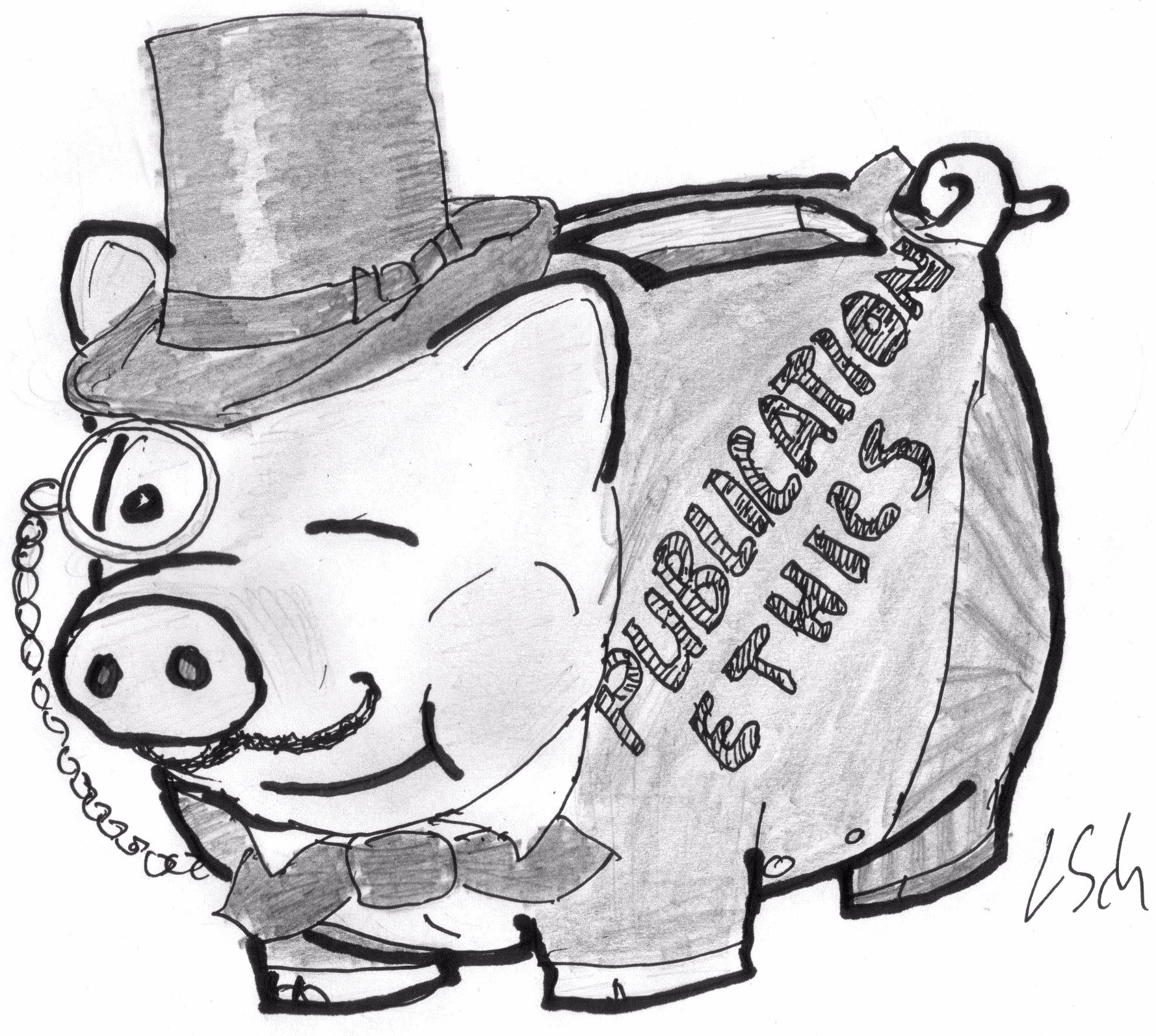
Donate!
If you are interested to support my work, you can leave here a small tip of $5. Or several of small tips, just increase the amount as you like (2x=€10; 5x=€25). Your generous patronage of my journalism will be most appreciated!
€5.00
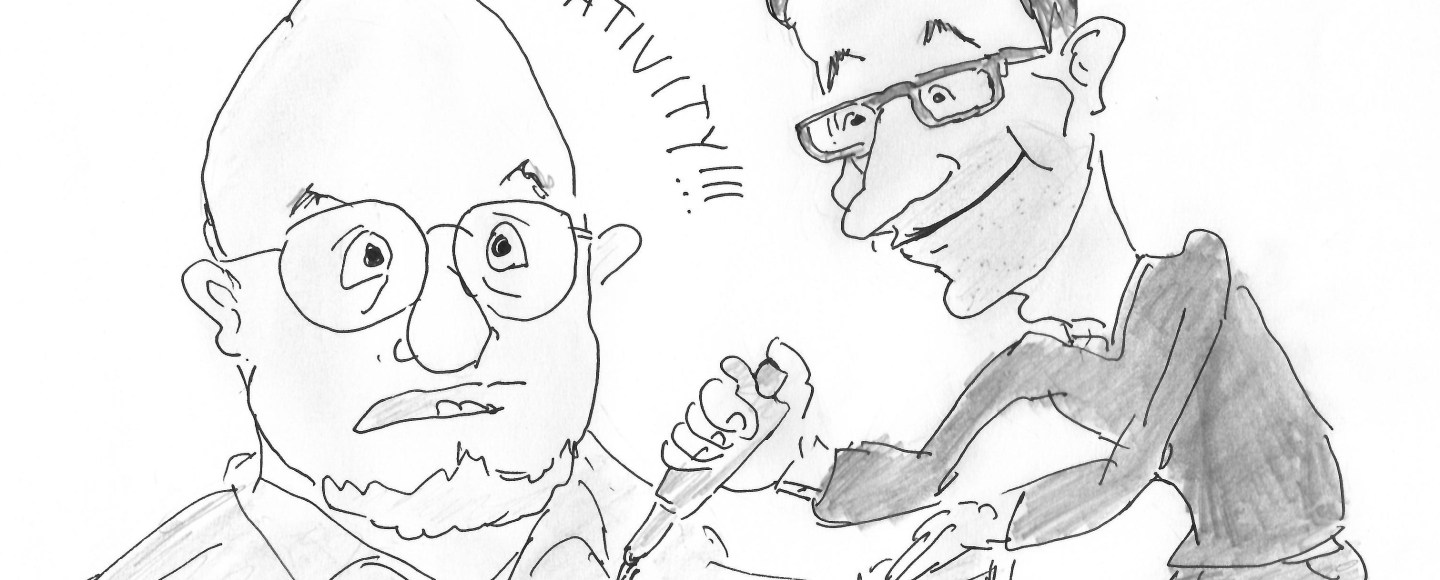
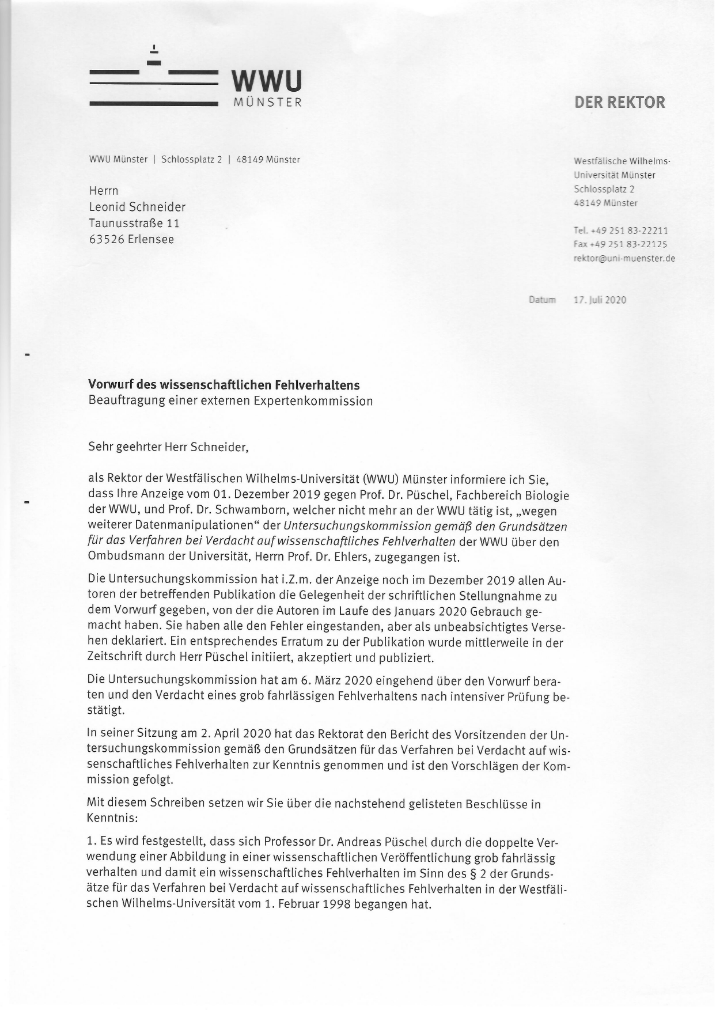
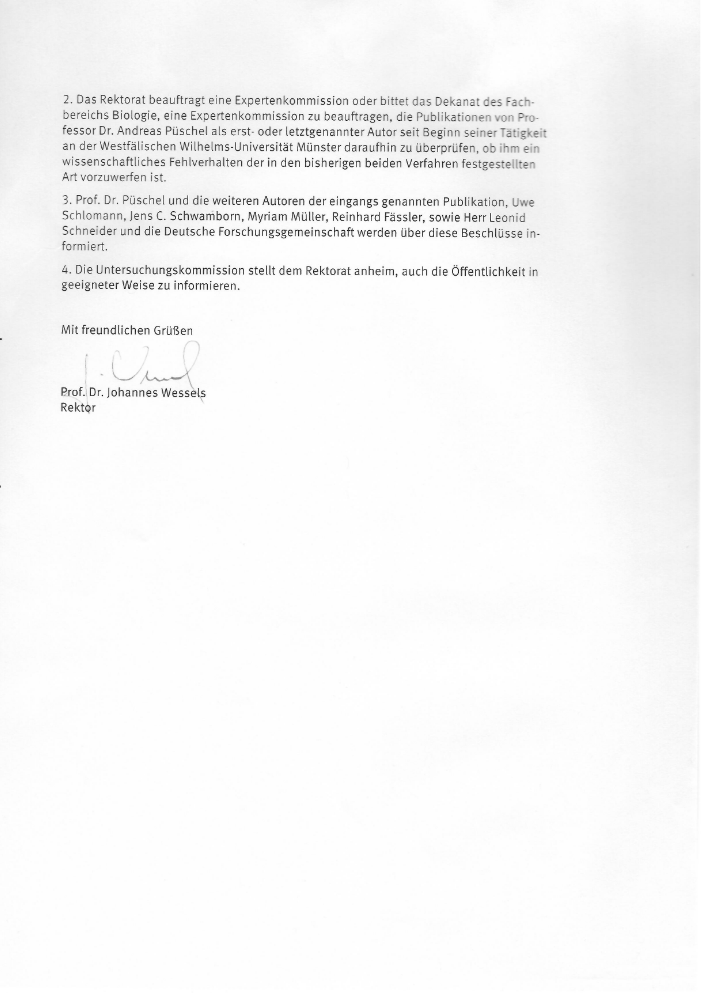

Hi Leonid
Nice work by you!!!
But misconduct once and everything is allowed to continue for Püschel?
Now, misconduct twice and what happens to Püschel?
When does he loose his tenure?
Cheers, Oliver
LikeLike
What I like in this example is the following: journals may issue a correction due to errors in a paper, but it DOES NOT mean that the paper is not manipulated. The journals do not have license to conduct a lab audit, they merely check data supplied by the authors to resolve specific questions. This is why it is important that universities and DFG (in Germany) start an audit if a paper has serious issues or retracted. May evergreen is the lab of loading control libraries and beyond….: https://forbetterscience.com/2018/12/06/western-blot-loading-control-libraries-and-beyond/
One paper was retracted, others were corrected, and when I inquired at DFG and the host university, they had no clue about these cases.
LikeLike
Article seems a bit salty. Do you have anything against the guy? Any relevance for the instagram inclusion?
LikeLike
Which Instagram? Are you sure you commented on the right page? Is salty a Belgian expression?
LikeLike
Apparently not (assuming that, if it were, not the English “salty” but the French “sal´” would be used): the excellent Base de données lexicographiques panfrancophone has no relevant entry. (Of course, if it turns out that it is a Belgian expression, I am sure the managers of the database would be pleased to be informed, with relevant data in support.)
LikeLiked by 1 person
Salty here is probably a direct translation of “salé” from French/Belgian. In French if you want to say that a comment is rather harsh, you’d say that the comment is “salé”. Don’t search for a translation because it comes from the French idiomatic expression “ça ne manque pas de sel”.
LikeLiked by 2 people
Thank you for your investigation. I clearly agree with you and that this story has to be investigated until the whole picture is clear.
I studied biology at the university of Münster. Pueschel was teaching one of the first courses of genetics in biology. I remember that many students never understood his questions in exams. It was almost some kind of arrogant behaviour to let the students fail. No offense, a clever professor and a lot of people liked his class because of the difficult aspects… in addition also Schwamborn had the reputation to be at the leading front of science, BUT he also had the reputation to be very arrogant and feeling himself a better scientist. Anyway, you get what you derserve…
Some things which are really shoking or suprising me:
A lot of scientists have the hidden elbowing mentality. This is a FALSE game and brings people to the top who have not earned the success or should not teach students. There are lot of scientist which are very precise, honest and want to become group leaders. I think Schwamborns behaviour is the most shoking part of the whole story. He would have gained his Phd also with one paper, even if it would not have been in Nature or EMBO. But he manipulated his career and thereby he pushed away other scientists who would have earned success (clearly he got the Max Planck position because of his publication list and connections to Schöler and Püschel). This is just a very very bad character.
How the hell is it possible, that he achieved another grand for 1.5 Million???? I clearly do not get it. Just google the guy and you see the past. He should just stay at his lab with little money until his pention and with the additional background shown by this blog it was not JUST ONE or TWO failures or manipulation attempts, we do not know how much of his Phd is true… if you misinterpret data in your thesis. Ok, this happens. Or if you have not enough proof for your conclusion, ok, begginers fault in your young carreer. But cutting gel slices or blots is a big manipulation!!!
The manipulation was done in such a bad way?!?!? That is not only manipulation but also not very clever…I mean taking protein bands of the same figure or paper and copying it… how many blots does a scientist produce during the Phd??? I dont get the whole story why it was done in such an unprofessional way.
We definitively need a reformation of science at university. Too many prof. are behaving badly and selfish. I left university because of this and heard the same from other friends. The system is corrupt. There are no control mechanisms…
LikeLiked by 1 person
He is not a project lead of the Luxembourg Parkinson study. I seriously hope no patients are exploited to advance personal careers here. Strangely enough there is no declaration of conflict of interest re the ‘mini brain’ company.
LikeLiked by 1 person
The study from Schwamborn’s postdoc on pubpeer
https://pubpeer.com/publications/9EBCB7546AD4AE0CF54DDE133121B3
LikeLiked by 1 person
Pingback: Remember Charles-Henri Lecellier? – For Better Science